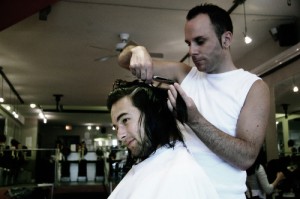Service as Performance: The "Symbolic Capital" of Turkish Hairdressers
 Photo: Jaako
Photo: JaakoAn upcoming article in the Journal of Consumer Research examines class, status, and power in a rather quirky environment: the metropolitan hair salons of Turkey. According to a new paper by Tuba Üstüner and Craig Thompson, getting a haircut might as well mean playing a master chess game – with more style, and a lot more status and class tension. Here’s the abstract:
Consumer researchers have commonly analyzed marketplace performances as liminal events structured by context-specific role playing, norms of reciprocity, and cocreative collaborations. As a consequence, this literature remains theoretically mute on questions related to the sociological disparities that arise when marketplace performances forge relationships between affluent consumers and underclass service workers: a circumstance becoming increasingly commonplace owing to trends in the service-oriented global economy. To redress this gap, we analyze how such sociocultural differences are manifested and mediated in the provisions of skilled marketplace performances. Building upon Bourdieu’s logic of field analysis, our resulting theoretical framework illuminates a network of structural relations that reconfigure the asymmetrical distribution of class-based resources between these class factions. Rather than being cooperative endeavors conducive to the formation of commercial friendships, we show that these class-stratified marketplace performances produce interdependent status games, subtly manifested power struggles, and contested forms of symbolic capital.
Becoming a hairdresser in Turkey is no easy feat. First and foremost, it is a male only profession, with a harsh apprentice system that starts at the beginning of adolescence. Hairdressers are recruited from poor rural families, but are expected to reinvent themselves into chic urban taste makers with an appropriate accent and appearance – they “acquiesce to the authority” of the middle class. This comes at a cost:
They describe feelings of being estranged from their families (most particularly from their fathers, who tended to adhere to traditional models of masculinity) and neighborhood friends as their identities, mannerisms, appearances, and life goals become less and less aligned with the norms and mores of their rural and squatter upbringing…
A hairdresser is expected to culturally transform himself, but his clients will never recognize him as a true equal – and herein lies the power struggle. After a years-long process of acculturation, hairdressers lay claim to a heightened understanding of “symbolic capital,” or mores of the elite. Clients reject this claim, while at the same time counting on the salon and hairdresser for their beauty status symbols. Clients point to how they expect to be treated with respect and formality – hairdressers describe their roles as high quality artisans and style deciders. Neither group would like to dwell on the interdependency of their relationship, and yet Turkish women are intensely loyal to their hairdressers. Üstüner and Thompson come to three main conclusions:
In the field of the metropolitan Turkish hair salon, these market-mediated class conflicts are manifested through three intersecting status games. Hairdressers use their acquired forms of symbolic capital in a quest to distinguish themselves from their rural and squatter cohorts and to proclaim their standing as legitimate middle-class consumers. Mass elite consumers recruit salon services into an intricate peer- group status game in which symbolic capital takes the form of being treated like celebrity clients (which implies a degree of dependency on the solicitous actions of their hairdressers). Third, consumer and hairdresser interactions manifest an interclass status game in which both parties vie for relative authority and control, with the legitimacy of the hairdressers’ symbolic capital often emerging as the critical point of contention.

Comments